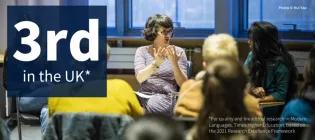In the last decade, particularly among feminist scholars, there has been growing interest in early modern women’s cultural, literary and political agency. This body of work is designed not merely to (re)shape our collective memory and imaginary, but also to challenge deeply ingrained paradigms about knowledge production. Building on her AHRC-funded project of 2010/11, Women's Spaces, Bodies and Voices, Dr Séverine Genieys-Kirk has been working with partners including the Institute of Advanced Studies in the Humanities (IASH) and L’Institut français d’Ecosse on learning to see the power of women. Since 2016, the project has comprised a series of ‘cultural encounters’ between past and present, unlocking disciplinary differences and opening a new field of cross-cultural and transmedial investigation.
In 2016, a three-day conference on ‘Recovering Women’s Past: New epistemologies, new ventures’ brought together 35 international experts to explore the power of women in Europe and America from the Renaissance to the present. Associated events included an exhibition, a guided tour of ‘The Subject and Me’ - Alice Neel’s first solo show in Scotland, a screening of the documentary MARCH, a public panel event, and a facilitated playwrights’ discussion. Since then, the project has held workshops and film screenings on female writers from the early modern period, including Mme de La Fayette and Mme de Villedieu. It has also hosted a two-day meeting of an EU Working Group, focusing on mapping the digital future of European Women Writers before 1900.
Funded by the School of Literatures, Languages and Cultures (LLC) Research Fund and Impact Fund
LLC team: Dr Séverine Genieys-Kirk (Principal Investigator)


